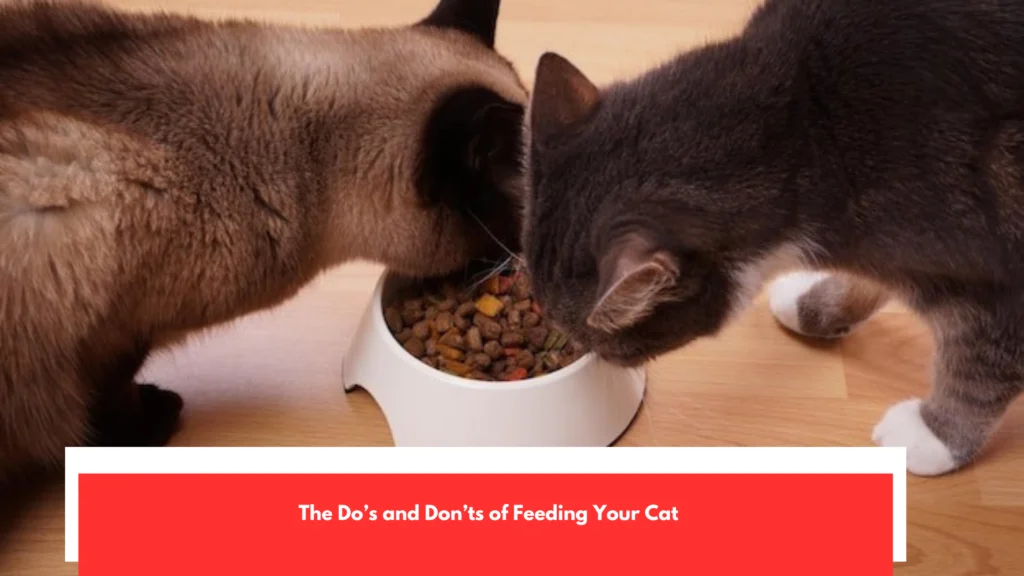The Do’s and Don’ts of Feeding Your Cat. It is all about your cat and we can tell you that you would do everything to protect it. This is why it is quite helpful that you are aware which substances or foods cats are not able to consume. To the cats, some of them are poisonous. Never feed them leftover scraps or treats without knowing their contents. The Do’s and Don’ts of Feeding Your Cat include choosing nutritious food and avoiding toxic items. Some of these toxic foods are as follows.
A harmful substance or food is one that is of harm to the organism which consumes them. It is even marked with production of undesired adverse effects which pose threats to sound health. Some of the foods which cats should not eat because they are poisonous to them are listed below. They are cats toxic foods when fed in great amount.
Foods to Avoid Feeding Your Cat

Nevertheless, the onion or garlic exposure, i.e., the combination of onion soup or garlicky sprinkled powder, is highly poisonous. Symptoms of lethargy, weakness, decreased appetite, pale gums, and urine with the color between orange and dark red indicate that a cat be taken to a veterinarian as soon as possible. Raw or uncooked eggs should not be fed to the cat, because we usually do not know where the eggs have been laid and this may lead to a poisoned cat in terms of salmonella or E. coli poisoning, just like in humans. Moreover, raw eggs too have an enzyme.
That may give trouble to the skin and coat of your cat. Try to stop your cat as much as possible to lick a broken egg or get exposure to this kind of food just to make sure that this food does not influence its health. These are foods that with ease can turn out to be a poison to a cat. Raw meat should never be given to your cat because of the diseases that it will carry along with it, not to mention the bacteria and quick decaying that may happen to such meat. Once again, it is the Salmonella or the E. coli in the cats. The illness has various symptoms, which could be vomiting, diarrhea, and lethargy.
Provide a Quiet Location

Salmonella and E. coli may be transmissible to human beings too, and this means that when cooking you must wash your hands thoroughly and also you must keep your cat off these raw foods. On the one hand, raw bones are products that cannot be consumed by cats because they may choke on it, break their digestive system, or teeth. It is not only that chocolate kills dogs, but this is also a food product that cats cannot consume. The ingredients of chocolate products are known to contain substances (methylxanthines) that trigger vomiting and diarrhea, elevated body temperature, shaking muscles.
Irregular heart rates, abdominal pains, excessive thirst and convulsions. Caffeinated drinks also have methylxanthines, which should not be consumed. On realizing that your cat is going through any of these symptoms, contact your veterinarian. Generally speaking, dark chocolates are more harmful in comparison with milk and white chocolates. Keep all foodstuff that contains chocolate off the reach of your furry friend. Your cat should not take alcoholic beverages and alcoholic foods.
The Right Amount & Temperature Matters

As they are harmful to him or her. Its consumption may lead to vomiting, diarrhea, tremors, disorientation, difficulty in breathing, state of coma, and even death hence the classification of it as a poison substance. Whenever you suspect that your cat has taken even slight doses of alcohol, then take it to the vet. Cats can be greatly intoxicated by alcohol. When you feed it with raw dough, yeast in it is able to ferment alcohol in its stomach and bring much damage. Hence it is not food that can be consumed by cats, otherwise they will fall ill. When baking in future, ensure the dough does not reach your cat as well.
Grapes and raisins are harmful even in small quantities to your cat. They cause quick progress of kidney failures; hence they are items that cats should not consume. Vomiting is felt after 12 hours of consumption and after 24 hours, lethargy comes in, diarrhea, poor appetite, pain in the abdomen, urinating less, and pain in stomach. Grapes and raisin can lead to kidney failing in cats but the reason why is unknown. The early symptoms are repeated vomiting and hyperactivity.
Avoiding Harmful Foods: Grapes, Raisins, and Milk for Cats

Not every cat suffers when fed on grapes or raisins, needless to say, it is better to avoid providing them with those and also not allow them to be on the countertops or anywhere within your cat reach. Your cat might enjoy milk and it does not mean that it is not harmful to him. The cats do not digest the lactose found in the milk. This may make them suffer stomach upset or diarrhea. The reason is that a large proportion of kittens have access to their mothers milk for a matter of weeks and therefore their digestive tracts are not prepared to deal with a reintroduction to lactose meaning that cats cannot eat it.
When they are still kitten they are not even supposed to drink anything but the milk of their mother because they can develop some sort of stomach problem later. My cat ate dog food, what do I do? Even though the food that dogs eat is not poisonous in cats, the combination of nutrients they require is significantly different than what a dog requires. The food must be rich with vitamin A, taurine, arachidonic and protein in cat food. Whereas there are very low quantities of these nutrients in dog food. Dogs have the ability to synthesize taurine and arachidonic acid whereas cats require them as part of food intake.
